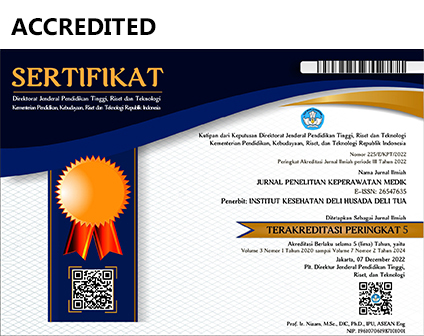The RELATIONSHIP BETWEEN LEVEL OF KNOWLEDGE AND SELF-MANAGEMENT OF TYPE 2 DIABETES MELLITUS PATIENTS AT BANDUNG GENERAL HOSPITAL MEDAN 2022
Chronic hyperglycemia and various metabolic disorders caused by unbalanced hormones can then cause chronic complications that occur in the blood vessels, damage to the eyes, impaired kidney performance, and damage to the basement membrane. Diabetes is defined as a degenerative disease caused by the slowing down of structure, tissue and function of body organs with age and lifestyle (Phitri & Widiyaningsih, 2013). Diabetes is a non-communicable disease, but the sufferer suffers for life (Perkeni, 2015). Diabetes is counted as the biggest cause of death every year, accounting for 2.3 million people and is ranked fourth among other deadly diseases. According to WHO 2016, the prevalence of DM has also increased in the last few decades. According to a 2017 report by the International Diabetes Federation (IDF), 123 million people over the age of 65 suffer from diabetes, 327 million people between the ages of 20 and 64 and an estimated 629 million in 2045. 10.3 million people, ranks sixth among the 10 largest countries after China, India, the United States, Brazil and Mexico, and is expected to continue to grow. around. 14.1 million people in 2035. From the results of research data conducted by the Central Java Provincial Health Office, there were 91,161 (1.59%) people with diabetes, in the Pemalang Health Office in 2018 there were 3,439 people (39%). Meanwhile, the Purwoharjo Health Center was ranked 3rd with 1,150 diabetics in 2016. The prevalence of diabetes continues to increase and causes increased morbidity and mortality due to complications such as organ dysfunction or failure which includes the eyes, nerves, kidneys, blood vessels and heart, and can cause hyperglycemia, hypoglycemia, ketoacidosis, neuropathy which increases the risk of necrotic ulcers which ultimately lead to amputations, kidney failure, and retinopathy, and can negatively impact those affected physically, psychologically, socially, and financially (American Diabetes Association, 2009). In fact, many sufferers already understand dietary recommendations for their condition, but many don't follow them. Then knowledge-based behavior is good. The level of knowledge required to deal with daily nutrition. However, everyone's ability to regulate their lifestyle and reduce the effects of this disease, known as self-management, varies widely. (Notoatmodjo, 2003). Self-management aims to improve the skills of sufferers for a better life journey in handling their illness. The self-management process includes reflecting on experiences, discussing emotions and feelings, handling in solving a problem, education and understanding in counseling, and setting goals and planning actions, which will lead sufferers to change lifestyles, especially dietary behavior (Putri et al 2013). Behaviors that show self-management include a healthy diet, increasing physical activity, taking medication on time, controlling blood sugar levels regularly, and doing foot care. Self-management that is done properly and correctly will reduce the risk of complications occurring in people with diabetes mellitus (Saqila & Siti Khoiroh, 2021).
Keywords:
Level of Knowledge, Self-management, Type two Diabetes Mellitus
Abstract
ABSTRACT Chronic hyperglycemia and various metabolic disorders caused by unbalanced hormones can then cause chronic complications that occur in blood vessels, damage to the eyes, impaired kidney performance, and damage to the basement membrane (Phitri & Widiyaningsih, 2013). This type of research uses a quantitative type. This type of quantitative research is analytic through a cross-sectional approach to determine a relationship between one variable and another. The results of the research from 40 respondents answered that the respondents had a good level of knowledge, namely 27 respondents (67.5%) and the least, namely the level of knowledge was not good, 6 respondents (15.0%), good self-management, namely 20 respondents (50.0%) and the least is self-management, there are 6 respondents (15.0%).Based on the results of the analysis using the chi-square test, a p value <0.05 (p=0.000) was obtained with the result there was a significant relationship between the level of knowledge and self-management in patients with diabetes mellitus type two.
Keywords: Level of Knowledge, Self-management, Type two Diabetes Mellitus
References
Atika, S., et al, 2014. SELF MANAGEMENT WITH DIETARY BEHAVIOR OF PATIENTS WITH DIABETES MELLITUS IN PUSKESMAS: 87-96
Citra Windani, M., et al, 2019. DESCRIPTION OF SELF MANAGEMENT IN TYPE II DIABETES MELITUS PATIENTS AT THE TAROGONG HEALTH CENTER, GARUT DISTRICT. Vol 15 No 1 : 1-11
Essy Phitri, H. & Widyaningsih, 2013. RELATIONSHIP BETWEEN KNOWLEDGE AND ATTITUDES OF DIABETES MELLITUS PATIENTS AND DIETARY COMPLIANCE WITH DIABETES MELLITUS AT AM Hospital. EAST KALIMANTAN PARIKESIT. Vol 1 No 1 : 58-74
Hertuida, C. 2014. RELATIONSHIP BETWEEN EDUCATION AND KNOWLEDGE WITH SELF MANAGEMENT BEHAVIOR OF TYPE 2 DIABETES MELLITUS. : 49-58
Ladina Saqila, R, Siti Khoiroh Muflihatin, 2021. RELATIONSHIP OF KNOWLEDGE AND SELF MANAGEMENT IN PATIENTS WITH DIABETES MELLITUS TYPE II IN THE WORKING AREA OF THE PALARAN HEALTH CENTER, SAMARINDA CITY. Vol 2 No 2 : 872-878
Mei Sundari, P. 2018. RELATIONSHIP LEVEL OF KNOWLEDGE AND DIABETIC SELF MANAGEMENT WITH STRESS LEVEL OF DIET WITH DIABETES MELLITUS, Thesis, Faculty of Nursing, Airlangga University, Surabaya.
Citra Windani, M., et al, 2019. DESCRIPTION OF SELF MANAGEMENT IN TYPE II DIABETES MELITUS PATIENTS AT THE TAROGONG HEALTH CENTER, GARUT DISTRICT. Vol 15 No 1 : 1-11
Essy Phitri, H. & Widyaningsih, 2013. RELATIONSHIP BETWEEN KNOWLEDGE AND ATTITUDES OF DIABETES MELLITUS PATIENTS AND DIETARY COMPLIANCE WITH DIABETES MELLITUS AT AM Hospital. EAST KALIMANTAN PARIKESIT. Vol 1 No 1 : 58-74
Hertuida, C. 2014. RELATIONSHIP BETWEEN EDUCATION AND KNOWLEDGE WITH SELF MANAGEMENT BEHAVIOR OF TYPE 2 DIABETES MELLITUS. : 49-58
Ladina Saqila, R, Siti Khoiroh Muflihatin, 2021. RELATIONSHIP OF KNOWLEDGE AND SELF MANAGEMENT IN PATIENTS WITH DIABETES MELLITUS TYPE II IN THE WORKING AREA OF THE PALARAN HEALTH CENTER, SAMARINDA CITY. Vol 2 No 2 : 872-878
Mei Sundari, P. 2018. RELATIONSHIP LEVEL OF KNOWLEDGE AND DIABETIC SELF MANAGEMENT WITH STRESS LEVEL OF DIET WITH DIABETES MELLITUS, Thesis, Faculty of Nursing, Airlangga University, Surabaya.
Published
2023-05-08
Section
Articles








